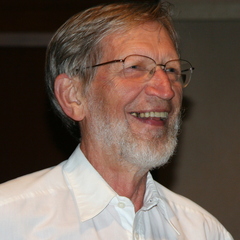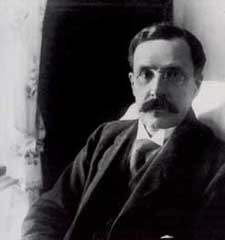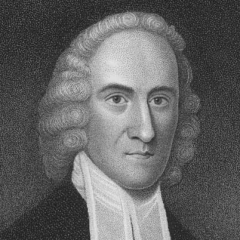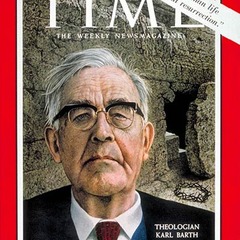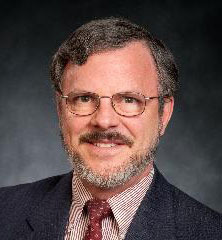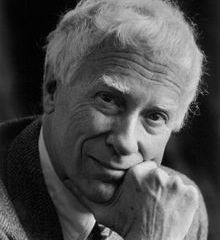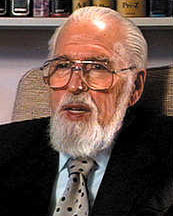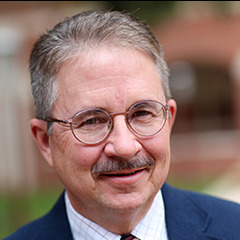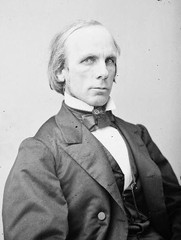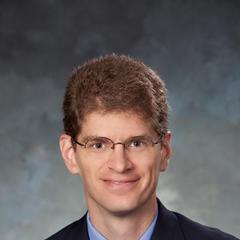Oliver D. Crisp quotes
-
“[John] Calvin's Institutes is often called a summary of Christian piety. You can't say that about many modern works of theology. You can say it of Calvin.”
-- Oliver D. Crisp -
“[Calvinistic tradition] has fashioned and shaped my thinking since I was a teenager.”
-- Oliver D. Crisp -
“It is often reported that the Five Points of Calvinism are the conceptual hard-core of Reformed thought. That is very misleading. The Five Points supposedly originate with the Synod of Dort in the early seventeenth century. Yet we find important Reformed leaders who were signatories to that documentation who don't think that limited atonement is the right way to think about the scope of Christ's saving work. How can this be? The answer that recent historical theology has thrown up is that the canons of the Synod don't require adherence to the doctrine of limited atonement.”
-- Oliver D. Crisp -
“There are constraints on what counts as "Reformed." It's more than a name or a label. It's about belonging to a particular theological stream or tradition, which is shaped in important respects by particular thinkers and their work, particular arguments and ideas, a particular community (especially, particular church communities, denominations, and so on), particular liturgies or ways of worshipping and living out the Christian life, and particular confessions that inform the practices of these communities.”
-- Oliver D. Crisp -
-
“God shows us in Christ what he would have to do if he were to punish us for our sins.”
-- Oliver D. Crisp -
“There is no such thing as a stationary tradition. Traditions are always developing, living things.”
-- Oliver D. Crisp -
“I think everyone who has an interest in Reformed theology, or just in Christian theology more generally, should read John Calvin Institutes.”
-- Oliver D. Crisp -
“[ Jonathan] Edwards is the person who really made theological determinism a serious option for Reformed thinkers, and the influence his views had in nineteenth century Reformed thought, in the USA and the UK in particular, is enormous.”
-- Oliver D. Crisp -
-
“Here is the interesting twist:[McLeod] Campbell came to his views through reading Jonathan Edwards who suggested at one point in his ruminations on the atonement that Christ could have offered up a perfect act of penitence instead of punishment, and that this would have been an acceptable offering suitable to remit our sinfulness.”
-- Oliver D. Crisp -
“There is the view I call penal non-substitution, or the penal example view. (It is also called the Governmental View in textbooks of theology.) This is often associated with Arminian theology stemming from the great Dutch jurist Hugo Grotius. However, the view was taken up by [Jonathan] Edwards's disciples in New England, who developed a Calvinistic strand of the doctrine.”
-- Oliver D. Crisp -
“Jonathan Edwards developed a Calvinistic strand of the doctrine.”
-- Oliver D. Crisp -
“Christ's work is a kind of deterrent to us, and a way of upholding the justice of God's divine government of the world.”
-- Oliver D. Crisp -
-
“The atonement chapter [from the book Saving Calvinism] shows how there are real riches in Reformed theology that most Christians today have no idea about.”
-- Oliver D. Crisp -
“The expansion I have in mind isn't the same as distortion. Of course, there are those who say their views represent Reformed thought, but what they end up with is a caricature of what Reformed thinking is really about. I hope I am not one of those people, but readers [of the Saving Calvinism] will have to make up their own minds on that score!”
-- Oliver D. Crisp -
“Reading [John] Calvin is a breath of fresh air.”
-- Oliver D. Crisp -
“For those who have only ever read about [John] Calvin, reading the man himself is an invigorating experience.”
-- Oliver D. Crisp -
-
“[John Calvin] writes clearly, directly, without artifice, and gets straight to the practical heart of the matter.”
-- Oliver D. Crisp -
“For those interested in Reformed thought more broadly, I'd recommend Peter Leithart's recent book on Reformed Catholicism entitled, The End of Protestantism: Pursuing Unity in a Fragmented Church (Brazos Press, 2016), as a thought-provoking and stimulating read that should get us all thinking about the future shape of the Church, wherever we come from.”
-- Oliver D. Crisp -
“[John] Calvin is often identified with his account of predestination. Yet that appears in the third book of his Institutes, not the first.”
-- Oliver D. Crisp -
“How many people in the pews know that [ Jonathan Edwards] is both a founder of evangelicalism and, say, an idealist who denied that the material world exists?”
-- Oliver D. Crisp -
-
“In the twentieth century the Reformed tradition was developed in several ways including additional confessions (Barmen, the Belhar Confession, the 1967 Confession of the PC(USA), and so on). It was also significantly augmented by the work of important thinkers like Karl Barth, T. F. Torrance, Jürgen Moltmann, Emil Brunner, Kathryn Tanner, and so on.”
-- Oliver D. Crisp -
“The Reformed tradition at the beginning of the twenty-first century is different as a consequence of this - and different in nontrivial ways. Some may scoff at this, saying that such "developments" don't represent Reformed thought. But by what standard? Perhaps by the Westminster Confession. But this is only one Reformed confession, and it was only ever a subordinate standard.”
-- Oliver D. Crisp -
“No confession is inerrant; Reformed Christians are supposed to be those who seek to be constantly reformed according to the Word of God - and that includes our confessions as well.”
-- Oliver D. Crisp -
“The book [Saving Calvinism] itself is not recommending that we move the borders, so to speak. It is recommending that we look at what lies within the confessional bounds of Reformed thought.”
-- Oliver D. Crisp -
-
“The alternative of hypothetical universalism, according to which Christ's work is sufficient for all but efficient only for the elect, was alive and well in early Reformed thought. Moreover - and importantly for our purposes - this view was not regarded as an aberration but as a legitimate position that could be taken within the confessional bounds of Reformed thought. But that means that the Five Points aren't the non-negotiable conceptual core of Calvinism after all.”
-- Oliver D. Crisp -
“In many ways the book [Saving Calvinism] is trying to argue for a more popular audience things I've said in some more scholarly works, namely, that the Reformed tradition is broader and more variegated than is often reported today, and that we need to recapture something of this in order that we don't end up unnecessarily narrow in our doctrine and in order to keep some perspective.”
-- Oliver D. Crisp -
“I do think that I have been fortunate to make friendships with other scholars, and form reading groups where ideas are exchanged and papers are read. That is a real boon, and it is something I think every scholar or writer can benefit from.”
-- Oliver D. Crisp -
“I'm sometimes asked about my productivity, which I find a bit embarrassing to be honest. I don't really have a particularly interesting answer to this question.”
-- Oliver D. Crisp -
-
“[John Calvin's] Humanist training makes him an excellent writer. What is more, he is as relevant today as he was 500 years ago.”
-- Oliver D. Crisp -
“One of the things we in the Reformed tradition are very good at is writing doctrinal theology!”
-- Oliver D. Crisp -
“The book [Saving Calvinism] argues in each case that the Reformed tradition is broader and deeper than we might think at first glance - not that there are people on the margins of the tradition saying crazy things we should pay attention to, but rather that there are resources within the "mainstream" so to speak, which give us reason to think that the tradition is nowhere near as doctrinally narrow as the so-called "Five Points of Calvinism" might lead one to believe.”
-- Oliver D. Crisp -
“[John Calvin's] treatment of the person and work of Christ, of the Holy Spirit in the life of the believer, of prayer and liturgy, of the sacraments, and of the way in which we have an in-built sense of the divine that we suppress to our great sorrow - these are all immense contributions to Christian thought. The same could be said of his commentaries, which are still regularly consulted by biblical critics today.”
-- Oliver D. Crisp -
-
“The best Reformed theology isn't just about careful arguments for theologically sophisticated conclusions. It is about how to live the Christian life.”
-- Oliver D. Crisp -
“That is the great contribution of Reformed thinking to the Christian church: theology for a life well-lived.”
-- Oliver D. Crisp -
“I recommend Doug Sweeney's recent book [Jonathan] Edwards the Exegete (Oxford University Press, 2015), which is a terrific treatment of the way in which Edwards was steeped in the Bible, so that it shaped the whole of his thinking.”
-- Oliver D. Crisp -
“We may think that our tradition is exactly the same as it has always been, but that is an illusion.”
-- Oliver D. Crisp -
-
“[John] Calvin is revered as a thinker of immense importance in Reformed thought, Jonathan Edwards could say in his preface to his treatise on Freedom of the Will that he had derived none of his views from the work of Calvin, though he was willing to be called a "Calvinist" for the sake of convention.”
-- Oliver D. Crisp -
“We are still living with the consequences of that today in popular Reformed thinking from the likes of John Piper, R. C. Sproul, and Tim Keller.”
-- Oliver D. Crisp -
“[Jonathan Edwards] he has to be engaged with on this issue if you're writing about Calvinism as I am in this book.”
-- Oliver D. Crisp -
“In the chapter on the nature of the atonement [in the book saving Calvinism] I argue that it is a mistake to think that penal substitution is the only option on the doctrine of atonement.”
-- Oliver D. Crisp -
-
“Now, don't get me wrong: I'm not rubbishing penal substitution. But there are other options that have been advocated by Reformed thinkers of the past.”
-- Oliver D. Crisp -
“For instance, the notion of non-penal substitution. This idea, found in the work of the nineteenth century Scottish Reformed theologian John McLeod Campbell and based upon his reading of the letter to the Hebrews in particular, is that Christ offers up his life and death as a penitential act on our behalf, rather than as a punishment in our stead.”
-- Oliver D. Crisp -
“To my mind [ Jonathan Edwards] is an interesting figure because he is both a canonical Reformed thinker, and yet also someone that pushed the envelope in a number of key areas of theology.”
-- Oliver D. Crisp -
“[ Jonathan] Edwards is one of my heroes. I've learned much from him over the years.”
-- Oliver D. Crisp -
-
“[Jonathan] Edwards definitely shows up in the book [Saving Calvinism]. He appears as one of the interlocutors in the chapter on free will, the other being the Southern Presbyterian theologian John Girardeau.”
-- Oliver D. Crisp -
“[I'm often called a Deviant Calvinist] but that only goes to underline the point I'm trying to make about the need to broaden our account of the tradition!”
-- Oliver D. Crisp -
“These days I'm often called a Deviant Calvinist, but I don't really think my views do deviate from the Reformed tradition, though in some respects they may represent views that are not as popular now as they once were, or that may represent a minority report in the tradition.”
-- Oliver D. Crisp -
“Sometimes we can lose the wood for the trees. Some specific issues dealt with in the book [Saving Calvinism]: the scope of election (who is saved?); the nature of the atonement (do we have to hold to penal substitution if we're Reformed?); the scope of the atonement (for whom did Christ die?); whether we have to hold to some sort of theological determinism (God ordains all that comes to pass).”
-- Oliver D. Crisp -
-
“The confessions don't speak with one voice. They are more like a cluster of closely-related but distinct voices - a kind of choir, if you like.”
-- Oliver D. Crisp -
“Reformed theology belongs to this confessional tradition, and Reformed theologians and churches continue to write confessions even today.”
-- Oliver D. Crisp -
“What I am trying to argue here [Save Calvinism] and in other works before this one is that the Reformed tradition as I have characterized it is much broader and richer than many of us today imagine. It is not just about "Five Points," and it was never just about [John ] Calvin's thought.”
-- Oliver D. Crisp -
“For instance, there are many mainstream Reformed theologians that deny the doctrine of "limited" atonement (the "L" in TULIP, the acrostic for the Five Points of Calvinism). These are not thinkers on the margins or troublemakers. They are leaders at the center of Reformed thinking like Bishop John Davenant.”
-- Oliver D. Crisp -
-
“I don't really have a lot of interns, although I do now use Research Assistants to help me compile indexes when that is necessary.”
-- Oliver D. Crisp
You may also like:
-
Alvin Plantinga
Philosopher -
Augustus Hopkins Strong
Theologian -
Jonathan Edwards
Preacher -
Karl Barth
Theologian -
Kevin Vanhoozer
Professor -
Nicholas Wolterstorff
Philosopher -
R.J. Rushdoony
Philosopher -
Roger E. Olson
Professor -
Matthew Levering
Author
